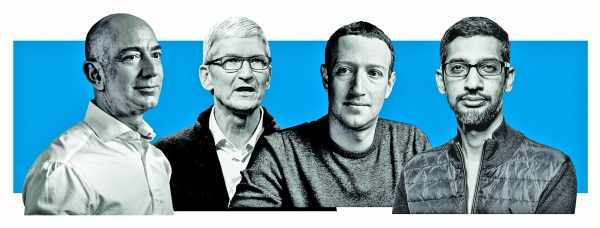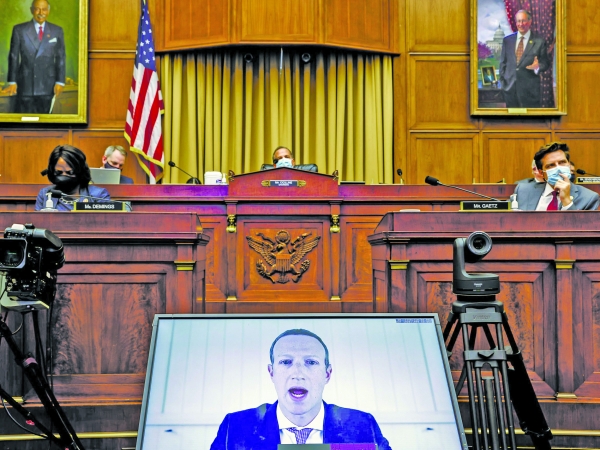
On July 29, Jeff Bezos of Amazon, Tim Cook of Apple, Mark Zuckerberg of Facebook, and Sundar Pichai of Alphabet (parent company of Google) went through a five-hour congressional grilling as lawmakers on the House’s top antitrust subcommittee confronted the executives for abusing their market dominance to neutralize potential competitors and even threaten consumers.
Representative David Cicilline, the chairman of the antitrust subcommittee of the House Judiciary Committee, opened a congressional investigation of Amazon, Apple, Facebook, and Google, aiming to provide the basis for proposals on how to reform America’s antitrust law. After 13 months of investigation, the subcommittee conducted hundreds of hours of interviews and collected 1.3 million documents.
“As gatekeepers to the digital economy, these platforms enjoy the power to pick winners and losers, shake down small businesses, and enrich themselves while choking off competitors,” said Cicilline in his opening statement. He added, “Our founders would not bow before a king. Nor should we bow before the emperors of the online economy.”
In response, the four chief executives, who testified via video conference due to the COVID-19 pandemic, tried to evade any accusations and presented themselves as participants in enormously competitive and rapidly changing digital marketplaces who significantly contributed to the U.S. economy.
The hearing set off with questions directed at Pichai about Google’s search engine. Cicilline accused Google of weaponizing its search engine to put its rivals at a disadvantage and lifting content from other websites to keep users within what he called the “walled garden”. He asserted that “As Google became the gateway to the internet, it began to abuse its power and use its surveillance over the web traffic to identify competitive threats and crush them.” Pichai disagreed with such characterization. He mentioned that Google had many competitors for specific categories of search, such as Amazon in shopping. He also stressed that the majority of Google’s search results did not carry advertisements and rather than stealing content, it was just trying to highlight the results that fit the interests of users.

Lawmakers accused Facebook of having systematically taken over other social media firms, such as Instagram, to prevent them from becoming serious competitors. Documents showed Zuckerberg telling his colleagues about acquisitions as a way of quashing a competitive threat shortly after Facebook bought Instagram. Other emails written by Zuckerberg stated that acquiring nascent startups will be a good outcome for everyone. In response, Zuckerberg said that Instagram’s success had never been guaranteed and was far from certain at the time. He stressed that Instagram had many competitors, and, without Facebook’s investment and support, it may never have grown so big.
Bezos faced questions on Amazon’s relationship with third-party sellers. Lawmakers disclosed interviews with former Amazon employees showing that Amazon used third-party seller data to develop their own competing products. Also, Amazon was accused of bullying small merchants. In response, Bezos argued that “third party sellers in aggregate are doing extremely well on Amazon,” and said that Amazon has “a policy against using seller-specific data to aid our private label business, but I cannot guarantee you that that policy has never been violated.”
Cook received questions about the way Apple controlled its App Store and whether it favored some app developers over others. The subcommittee released documents showing Apple providing Baidu, the Chinese search giant, special treatment where it provided “app review fast track” and two Apple employees who would help manage the process. Also, it was revealed that Apple let Amazon avoid Apple’s 30% commission fee on its video streaming service in exchange for making Amazon and Apple’s products to work better together. In response, Cook said that any other company could get the same kind of deal. When asked why Apple removed third-party apps that help parents control children’s devices before introducing its own app, Cook argued that this was done to protect its users’ data, not to hurt competing apps. He further argued that Apple has “open and transparent rules” and treats all app developers equally. He also stressed that Apple faces “fierce competition at the developer side and the customer side.”


